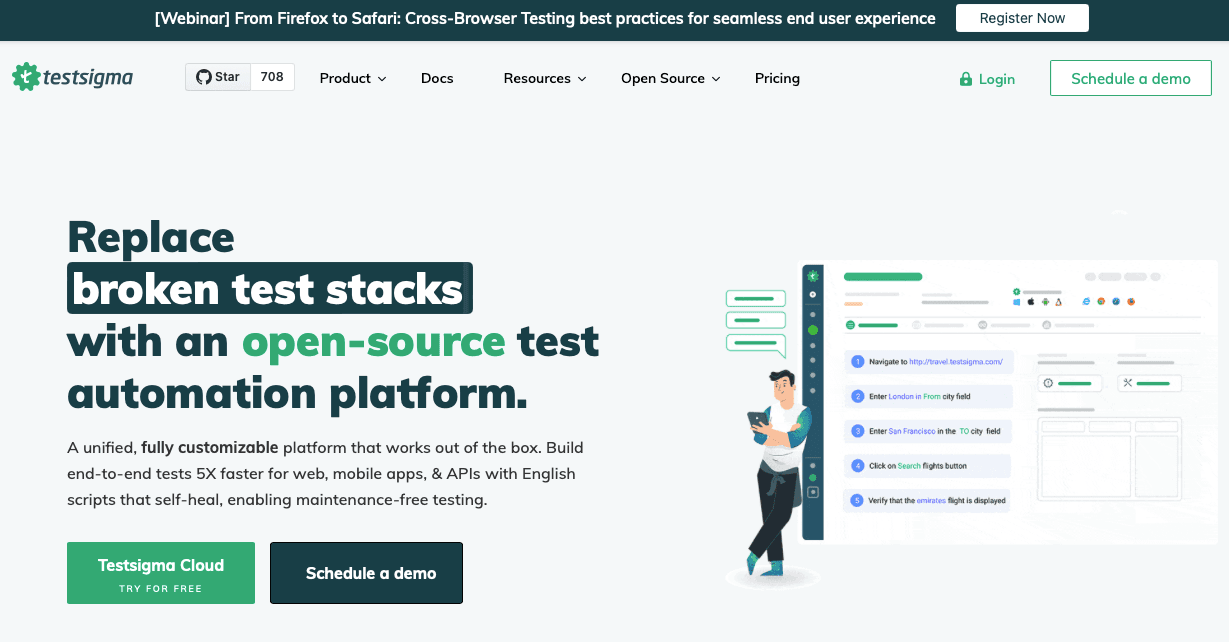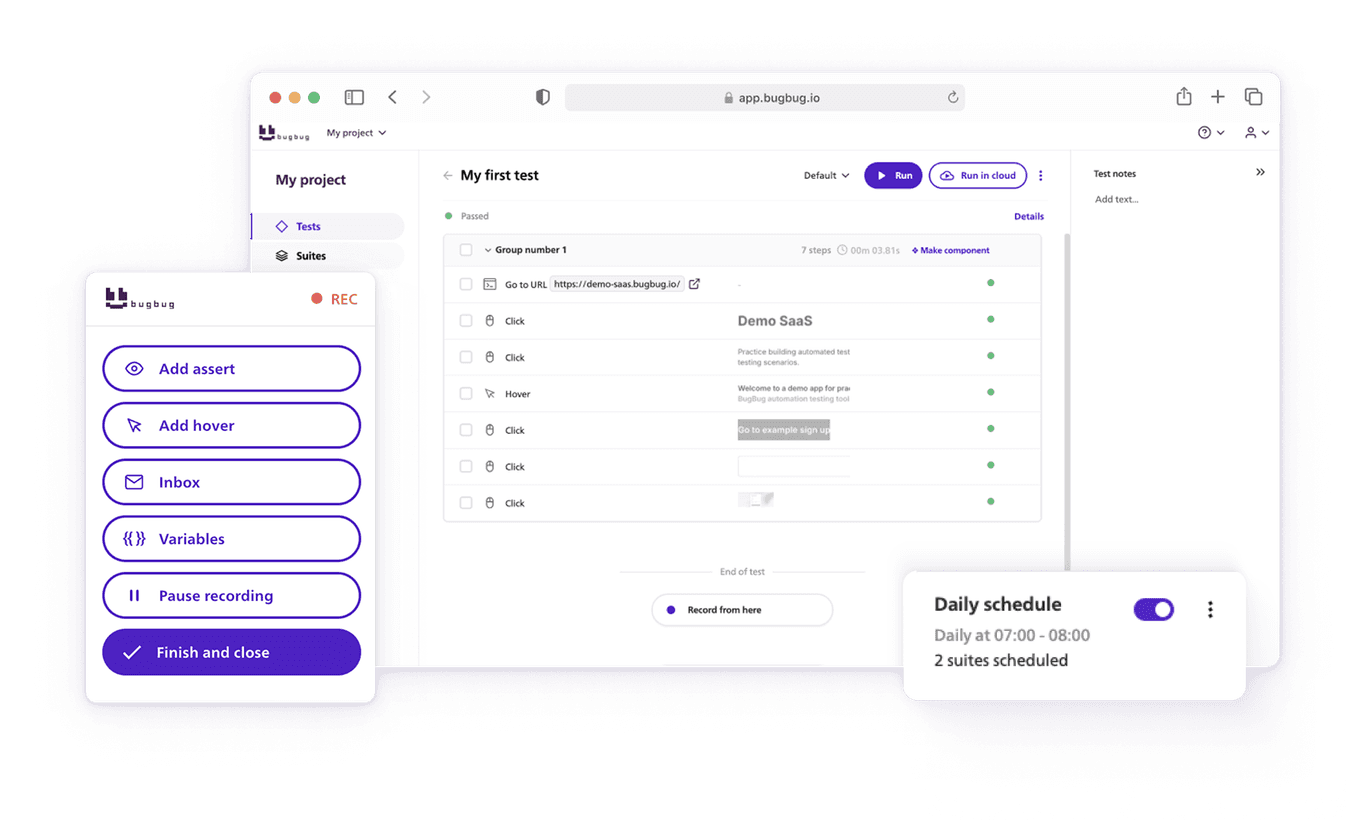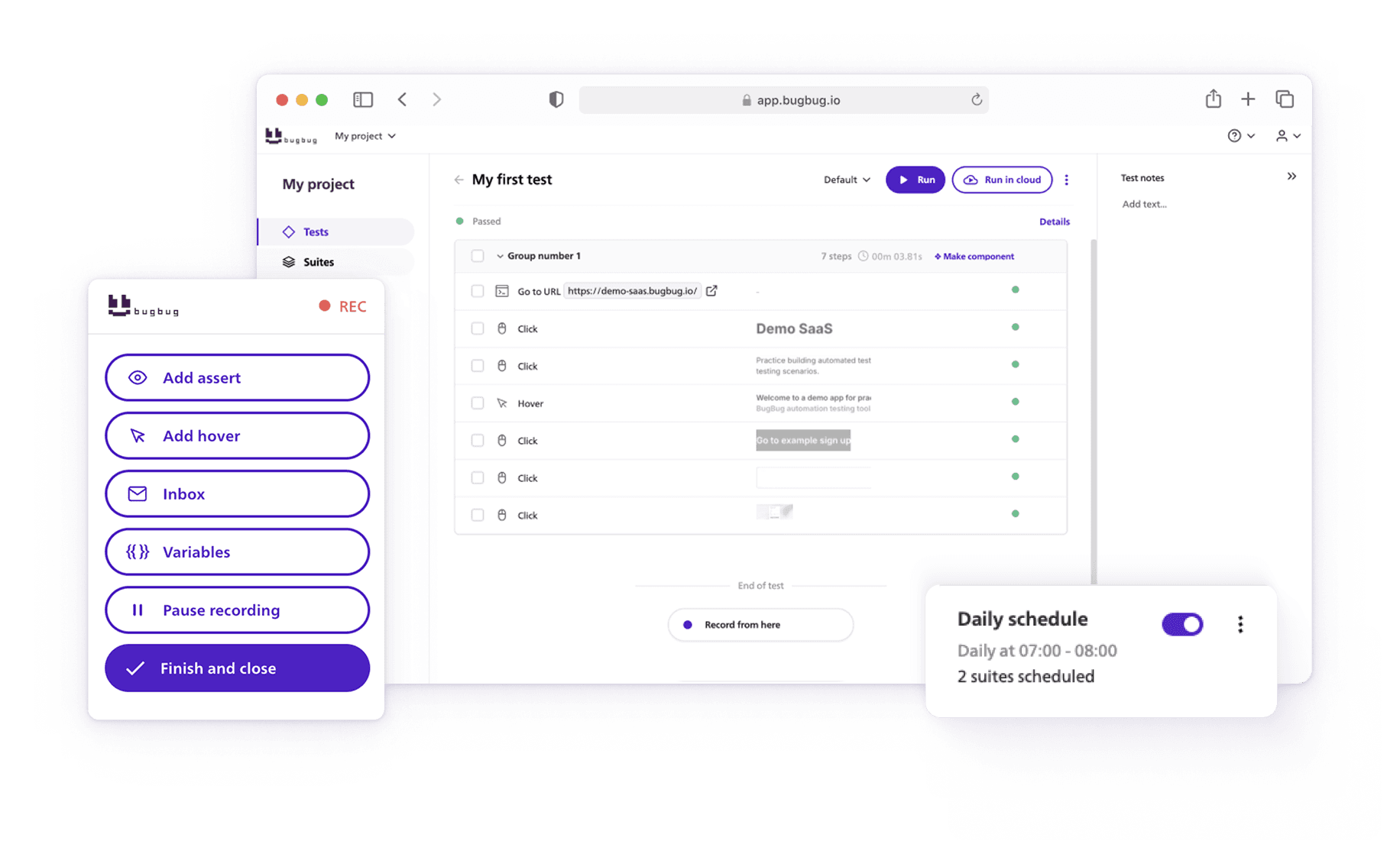Choosing the right test automation tool can make or break your testing strategy—especially when dealing with complex testing scenarios, multiple platforms, or a limited budget. While Opkey is known for allowing users to automate functional testing without writing code, many organizations are now exploring other test automation tools that offer more flexibility, support various testing types, or come with more competitive pricing.
We’ll walk you through examples, highlight key differences, and show you which tools can help you create, execute, and improve your tests—whether you're using Selenium, working on enterprise software development, or just starting with automation. Let’s explore the best alternatives and find the right fit for your organization.
🎯 TL;DR - Best Opkey Alternatives
- Opkey is great for ERP testing but has limitations: While Opkey offers a no-code platform tailored for ERP systems like SAP or Oracle, it lacks flexibility, can be expensive, and misses key features like CI/CD and mobile support.
- Why teams seek alternatives: Organizations look for tools that offer broader testing capabilities, better pricing, modern integrations (e.g. CI/CD), and easier scalability beyond ERP-focused testing.
Best Opkey Alternatives include:
-
Testsigma: AI-powered no-code test automation tool for web, mobile, and API testing; great for non-technical users and agile teams.
-
BrowserStack: Cloud-based platform for live and automated cross-browser testing on real devices; ideal for UI, visual, and compatibility testing.
-
LambdaTest: High-speed parallel testing with smart visual regression; strong CI/CD support and excellent for scaling web app testing.
-
Katalon Platform: Combines no-code and scripted automation for web, API, mobile, and desktop; suited for both technical and non-technical teams.
-
BugBug: Lightweight, codeless tool built for fast and affordable web testing; perfect for startups and agile teams needing simple CI/CD integration.
What is Opkey?
Opkey is a no-code test automation platform that empowers both business users and QA professionals to automate testing—particularly for ERP systems like Oracle, SAP, Workday, and Microsoft Dynamics. It’s designed to simplify testing processes without the need for coding expertise.
Key Features of Opkey
- No-Code Automation: Drag-and-drop interface with a library of pre-built test cases.
- ERP-Specific Testing: Built-in understanding of ERP workflows and data structures.
- API & Data Integration: Ensures smooth communication between ERP and third-party apps.
- Record & Replay: Converts manual interactions into automated test scripts.
- Cross-Browser Testing: Ensures ERP apps work across multiple browsers.
- Reporting & Analytics: Visual dashboards and insights for test results.
- Version Control & Collaboration: Manage changes and collaborate in teams.
- Scalability: Handles large, complex test suites with ease.
Opkey Pros & Cons
✅ Pros
- User-Friendly Interface: Ideal for non-developers thanks to no-code functionality.
- Speed: Quickly turns test cases into automated scripts.
- ERP Specialization: Provides accurate testing for major ERP systems.
❌ Cons
- ERP-Centric: Limited testing support beyond ERP platforms.
- High Cost: May not be ideal for budget-conscious or growing teams.
- Limited Flexibility: Less customization for teams needing deep control or advanced scripting.
- Missing Advanced Features: Lacks some robust capabilities like CI/CD, mobile testing, or performance testing.
- Steep Learning Curve for Coders: Developers used to script-based tools may find it unintuitive.
Automate your tests for free
Test easier than ever with BugBug test recorder. Faster than coding. Free forever.
Sign up for free
Criteria for Choosing an Opkey Alternative
If Opkey isn't quite the right fit for you, here are the key factors to consider when comparing alternatives:
- Testing Scope: Do you need to test web, mobile, APIs, or desktop apps beyond ERP?
- Budget: Look at free, open-source, or cost-effective solutions.
- Technical Expertise: Does your team prefer low-code/no-code tools or script-based automation?
- Key Features: Consider needs like CI/CD integration, visual testing, data-driven testing, etc.
- Scalability & Flexibility: Can the tool grow with your team and projects?
- Ease of Use: Is the platform intuitive and quick to learn?
- Support & Community: Are support resources and user communities readily available?
- Integration: Does it work well with your existing tool stack?
- Cross-Browser & Mobile Testing: Essential for modern web and mobile applications.
- Cloud vs. On-Premise: Consider where and how you want to run your tests.
Top Opkey Alternatives in 2025
Let’s take a closer look at seven of the best Opkey alternatives in 2025:
Testsigma
For teams seeking an AI-powered no-code platform for web, mobile, and API testing

Testsigma offers a unified test automation platform that enables test creation in plain English. It’s designed for agile teams and non-technical users looking to automate across many platforms with ease.
Key Features:
- Plain English Test Creation
- CI/CD Integration
- AI-Driven Test Suggestions and Maintenance
- Support for Web, Mobile, and API Testing
Strengths:
- Easy for non-technical users to adopt
- Supports multiple testing types and platforms
- Scales well for growing QA needs
Shortcomings:
- Limited flexibility for teams wanting full scripting control
- Pricing may be high for small or budget-conscious teams
Use Cases:
- Regression testing during rapid release cycles
- Automating mobile and web app tests with minimal coding
- Integrating automation into CI/CD pipelines
- Cross-team collaboration between business and QA teams
BrowserStack
For comprehensive cross-browser and real device testing

BrowserStack is a cloud-based testing platform that enables real device testing and supports over 3,000 browser-device combinations. It’s ideal for teams prioritizing visual quality, cross-browser compatibility, and accessibility.
Key Features:
- Real Device Cloud
- Visual Regression and Accessibility Testing
- CI/CD Tool Integration
- Live and Automated Testing Environments
Strengths:
- Enterprise-grade test infrastructure
- Instant access to real browsers and devices
- Strong ecosystem and support
Shortcomings:
- Higher cost compared to other cloud platforms
- Limited test creation capabilities (not a full test authoring solution)
Use Cases:
- Verifying UI on different screen sizes and browsers
- Accessibility and visual consistency checks
- Quick cross-browser validation during release cycles
- Mobile web testing without physical devices
LambdaTest
For high-speed parallel testing and visual regression across browsers

LambdaTest is built for high-volume parallel testing and provides robust features for both manual and automated testing across web and mobile browsers.
Key Features:
- Parallel Test Execution
- Smart Visual Regression Testing
- CI/CD Integrations
- Extensive Browser & OS Coverage
Strengths:
- Excellent scalability with parallel testing
- Detailed reporting and analytics
- Reliable cloud infrastructure
Shortcomings:
- Some advanced features require technical expertise
- Limited support for native mobile apps
Use Cases:
- Running 100s of browser combinations in parallel
- Visual bug detection before release
- Automated regression testing in CI/CD workflows
- Compatibility testing for web apps
Katalon Platform (Katalon Studio)
For teams needing both no-code and scripted automation across web, API, and mobile

Katalon offers a flexible test platform combining no-code ease with scripting power. It's well-suited for diverse teams handling both basic and complex automation tasks.
Key Features:
- Dual Authoring (No-Code + Scripting)
- Built-in Test Libraries
- Data-Driven Testing
- Web, Mobile, API & Desktop Testing Support
Strengths:
- Versatile for teams of all skill levels
- Covers a wide variety of testing needs
- Robust test management capabilities
Shortcomings:
- Can be heavy for simple use cases
- Initial setup may take time
Use Cases:
- Automating regression and smoke tests
- API and end-to-end web testing
- Teams with both technical and non-technical testers
- Scenarios requiring advanced test customization
Rainforest QA
For non-technical teams needing fast validation from real users

Rainforest QA combines automation and crowd-sourced testing, making it ideal for startups and fast-moving teams that need quick, human-validated feedback.
Key Features:
- Crowd-Tested Automation
- No-Code Test Creation
- Fast Execution Results
- Real User Feedback Loop
Strengths:
- Extremely fast validation cycles
- No in-house QA team required
- Intuitive UI and onboarding
Shortcomings:
- Limited to functional UI testing
- Not designed for backend or API testing
Use Cases:
- Validating user flows before deployment
- Quick smoke testing before major launches
- Ensuring consistent functionality across UI changes
- Teams without internal QA resources
UiPath
For automating business processes and testing with robotic process automation

UiPath is an enterprise-grade RPA platform with added testing capabilities. It’s perfect for teams looking to combine process automation with application testing.
Key Features:
- Robotic Process Automation
- Functional Test Suite
- Visual Flow Designer
- Integration with Enterprise Systems (e.g., SAP)
Strengths:
- No-code interface for business process automation
- Excellent for repetitive and cross-system tasks
- Rich ecosystem for enterprise IT
Shortcomings:
- Not focused solely on QA/testing
- May require more configuration upfront
Use Cases:
- Validating SAP and ERP workflows
- Automating repetitive form submissions and data checks
- Business logic testing across legacy systems
- Automating test data preparation
Automate your tests for free
Test easier than ever with BugBug test recorder. Faster than coding. Free forever.
Sign up for free
ACCELQ
For enterprise-grade continuous testing across many platforms

ACCELQ is a cloud-native, codeless automation platform tailored for enterprise-level testing needs across web, API, mobile, and packaged apps like SAP.
Key Features:
- Codeless Test Creation
- API, Web, Mobile & SAP Testing
- End-to-End Test Automation
- Native CI/CD Support
Strengths:
- Designed for large-scale enterprise testing
- All-in-one platform with test design, execution, and reporting
- Easy collaboration between dev and QA teams
Shortcomings:
- May be overkill for small projects
- Higher pricing geared toward enterprise users
Use Cases:
- Automating end-to-end workflows across multiple platforms
- Validating SAP modules and business processes
- Continuous testing in CI/CD pipelines
- Collaboration across large QA teams
When to Consider BugBug - Codeless Testing
BugBug is a lightweight, codeless test automation tool built for modern web apps—perfect for agile teams and budget-conscious startups who want fast, reliable testing without the complexity of enterprise-heavy tools like Opkey.
Why Choose BugBug Over Opkey?
✅ Codeless & Easy to Use – No coding skills needed
✅ Edit & Rewind – Debug and adjust tests in seconds
✅ Unlimited Runs, Users & Projects – Even on the free plan
✅ CI/CD-Ready – Fits right into your pipeline
✅ Affordable & Transparent Pricing – Freemium and Pro plans starting at $99/month
Unlike Opkey, which focuses on ERP testing and complex enterprise systems, BugBug is purpose-built for web application testing—making it the go-to choice for fast-moving product teams that care about speed, simplicity, and scalability.
Automate your tests for free
Test easier than ever with BugBug test recorder. Faster than coding. Free forever.
Sign up for free
Final Thoughts
Whether you're looking to verify workflows across web, mobile, or desktop applications, improve test execution speed, or simplify test maintenance, this guide will help you compare Opkey with other tools that may better suit your specific needs. From platforms that support model-based testing, continuous integration, and load testing, to solutions tailored for real users and budget-conscious teams, we broke down the basic features that matter most.
From Testsigma and BrowserStack to BugBug and Katalon, each platform brings unique strengths to the table. Start by identifying your top priorities—be it budget, technical flexibility, or test coverage—and choose the tool that aligns best with your team’s goals in 2025.
Happy (automated) testing



